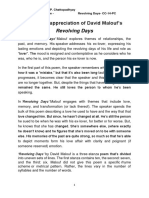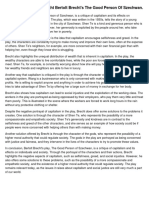1
Revolving Days
-David Malouf
About the Author
David Malouf was born in Brisbane, Australia, in 1934. In addition to various collections of poetry and
short stories, Malouf has published nine novels, including The Great World (1990), which won the
Commonwealth Writers’ Prize; Remembering Babylon (1993); and Ransom (2009). Malouf received the
Neustadt International Prize for Literature, the Age Book of the Year Award, and the Miles Franklin
Literary Award. He was made an Officer in the Order of Australia in 1987, an Honorary Fellow of the
Australian Academy of the Humanities in 1989, and an Australian National Living Treasure in 1997.
Malouf has taught English at the University of Queensland, the University of Sydney, and elsewhere. He
currently lives in Sydney, Australia.
Within ‘Revolving Days’ Malouf explores themes of relationships, the past, and memory. His speaker
addresses his ex-lover, expressing his lasting emotions and depicting the revolving days of his life and
role as “lover”. The mood is resigned and contemplative as he considers who he was, who he is, and the
person his ex-lover is now.
In the first part of this poem, the speaker remembers when he fell in love, how it was a “mistake,” but that
it’s also been long-lasting. As the poem progresses, it becomes clear that the speaker and this person he
loves are no longer together. But, despite the things that have changed, he has remained the same. He still
loves the person to whom he’s been speaking.
In ‘Revolving Days’ Malouf engages with themes that include love, memory, and transformation (or lack
thereof). The speaker spends the bulk of this poem describing a love he used to have and the way that that
love changed him. But since, he hasn’t changed at all. He’s still the person he sued to be when he was
with his ex-lover, for better or for worse. But he knows that she has changed. She’s somewhere else,
(where exactly he doesn’t know) and he figures that she’s moved on to be with someone else. His
memories of the past are quite strong, so much so that he’s able to depict moments form his love affair
with clarity and poignant (if someone reserved) emotion.
The Poem
That year I had nowhere to go, I fell in love — a mistake
of course, but it lasted and has lasted.
The old tug at the heart, the grace unasked for, urgencies
that boom under the pocket of a shirt. What I remember
is the colour of the shirts. I'd bought them
as an experiment in ways of seeing myself, hoping to catch
in a window as I passed what I was to be
in my new life as lover: one mint green, one
pink, the third, called Ivy League, tan
with darker stripes, my first button-down collar.
� 2
In the first stanza of ‘Revolving Days,’ the speaker looks back on his life and remembers the year that he
“fell in love”. He explains it simply, it happened because he had nowhere to go. This frivolous start
dissolves as he adds that it “lasted and has lasted”.
The next lines use imagery as a way of painting a picture of the past, as well as evoking in the reader an
emotional response to the speaker’s personal life. He recalls what it felt like to be falling in love.
Specifically, the “boom under the pocket of a shirt” urging him on and the “old tug at the heart”.
In an original depiction of a lover’s mind, he describes buying shirts and using them as a way to
understand himself as “lover”. These ranged in color and one was his “first button-down collar”.
We never write. But sometimes, knotting my tie
at a mirror, one of those selves I had expected
steps into the room. In the next room you
are waiting (we have not yet taken back
the life we promised to pour into each other's mouths
forever and for ever) while I choose between
changes to surprise you.
As the poem progresses it becomes clear that the love the speaker experienced is a little more complicated
than it seemed. It “lasted” but not in the way one might immediately expect. He looks to the past, while
also considering the future, in this stanza.
The past comes back to greet him while he’s in the bathroom looking in the mirror and he recalls the time
they spent together and the promises they made. These have fallen to the wayside as has the relationship.
Revolving days. My heart
in my mouth again, I'm writing this for you, wherever
you are, whoever is staring into your blue eyes. It is me,
I'm still here. No, don't worry, I won't appear out of
that old time to discomfort you. And no, at this
distance, I'm not holding my breath for a reply
In the final stanza of ‘Revolving Days,’ the speaker makes use of the phrase “Revolving days” to depict
the nature of his heart and memory. He is writing “this for” his ex-lover. They are no longer together. In
fact, he doesn’t know where they are. They could be with someone new. Despite the changes that have
happened he’s the same. Before the intended listener/the speaker’s ex-lover starts to worry, he says he’s
not going to pop up form the past “to discomfort” them. They are at a distance and he knows there is very
little chance he’ll be getting a reply to this letter in poem form.
In this poem, the speaker reflects on a time in his past when he fell in love. He calls it a "mistake / of
course," but it seems as though the feeling has stayed with him nonetheless. He recalls the feelings he felt
but also the colors of the shirts he purchased then, for his new life as a lover. He and his lover do not stay
in touch. However, sometimes he feels like he tried to feel then, like one of the new selves in the new
shirts, and he feels as though he is right back there in the relationship again. The time passes and days go
by, but the speaker still feels that his "heart / [is] in [his] mouth again." His feelings remain unchanged,
then, and he considers who she might be involved with now. In the end, however, he assures her that he
will not reappear in her life and doesn't mean to cause her any discomfort; he expects nothing from her
and does not expect to hear from her.







































































